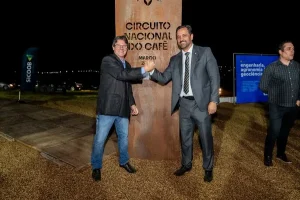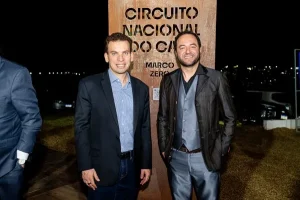

The choice of Varginha for the inauguration of Marco Zero, the official starting point of the National Coffee Circuit, is due to its historical prominence as the initial center for coffee exports; the inauguration event will take place on July 29 at 6:30 p.m. in Varginha; the Marco with QR Code will guide tourists to hotels, restaurants and coffee farms.
The National Coffee Circuit is taking another important step towards consolidating the route, which connects the coffee-growing cities of Minas Gerais and the interior of São Paulo to the Port of Santos, with the installation of Marco Zero in Varginha. The city was chosen to host the first landmark because it stands out on the national and international scene for its production and marketing of the bean and as a major exporter of coffee in Brazil, especially Arabica coffee. On
In July, at 6:30 p.m., Varginha, the birthplace of coffee in the south of Minas Gerais, will become the official starting point of the National Coffee Circuit. The event will bring together businesspeople from the sector, authorities and the press at Fazenda Pro Café.
The inauguration of the landmark celebrates the start of an ambitious project that promises to redefine the tourist experience and foster a new chain of opportunities. According to the cultural manager and creator of the Circuit, Edgar Bessa, the choice of Varginha to house the first monument on this map of coffee-growing cities is not a coincidence, but a recognition of its strategic importance. In addition, the region is famous for its beautiful farms, which helps to boost tourism in the area. According to Bessa, the physical landmark will be installed at Trevo do Porto Seco, an emblematic location that is reminiscent of the first Customs Station in the interior of Brazil, established in the 1950s. "This structure was vital for coffee logistics, centralizing regional production before its journey to the ports and global export, consolidating the city as a pillar in the development of coffee growing in Minas Gerais," says the executive.
This initiative is the seed of a prosperous future for tourism and the grain economy in the state. For the mayor of Varginha, Leonardo Ciacci, receiving Marco Zero is an honor that reflects the soul of the city. Varginha has coffee in its DNA. We were the logistics center that propelled the Minas Gerais bean to the world. Assuming the position of mother city of this National Circuit means embracing our historical protagonism and turning it into an engine for the future. This milestone is not just a tribute to the past, but a commitment to generating jobs, income and strengthening our cultural identity for generations to come, says the mayor.
How will the installation of the landmarks on the National Coffee Circuit work?
The project is already showing an accelerated pace of expansion. According to Edgar Bessa, another six milestones are expected to be installed this year, with the aim of covering all 51 towns on the initial route by the end of 2025. Towns such as Carmo do Rio Claro, Guapé, Alfenas, Elói Mendes, Três Corações and Três Pontas are already looking forward to their official inclusion in the Circuit.
To guarantee an immersive and functional experience for visitors, each landmark installed along the Coffee Circuit will have a QR Code. When scanned, the code will direct the tourist to the Circuit's official portal, offering a complete guide with information on tourist attractions, accommodation options, restaurants, and a detailed itinerary of the producing farms open to visitors in each municipality, integrating technology with tradition. The materialization of this
he grandiose project in Varginha is the result of a strategic collaboration with the sponsors Porto Seco Sul de Minas and Fazenda Pro Café, one of the state's leading coffee producers, and the institutional support of Varginha City Hall.
Varginha's Municipal Secretary for Tourism and Commerce (Setec), Rosana Aparecida Carvalho, highlights the practical and immediate impact of the initiative. Marco Zero acts as a catalyst for a new era of tourism in Varginha and the region. It allows us to structure and promote our entire production chain in an integrated way: from the century-old farms that are now open to visitors, through our rich gastronomy, to the hotel chain and local commerce. It is
the missing cog to boost economic development in a sustainable and organized way, the secretary points out.
Initially, the National Coffee Circuit covers 51 municipalities spread across the Alto Paranaíba, Triângulo Mineiro and Sul de Minas regions and will welcome new cities with a Complementary Law. The initiative is supported by federal law 14.718/2023, which recognizes the vast coffee territory, including areas of Minas Gerais and São Paulo, as the 14th National Monument, giving the project a legal basis and recognition of its importance to Brazilian heritage.
Edgar Bessa sees the project as the materialization of a dream that connects the land to the human experience. We are creating much more than a tourist map of coffee; we are weaving a network that unites culture, traditions, breathtaking landscapes and, of course, the sensory experiences that only our coffee can offer thanks to rural producing families. "The Circuit was born to value each producer, each family story and to transform our rich coffee regions into destinations desired by travelers from Brazil and around the world," explains Bessa.
